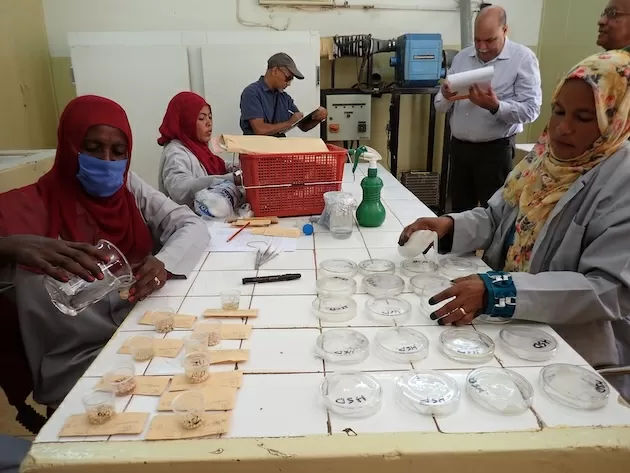Sudan, a country located in Northeast Africa, is known for its rich agricultural heritage and diverse crops. However, this heritage is at risk of being lost due to the ongoing conflict that has plagued the country for years. The conflict has not only claimed countless lives but has also threatened the livelihoods and food security of the Sudanese people. In the midst of this chaos, one man, Ali Babiker, is fighting to protect Sudan’s future food security. But he is not using weapons, instead, he is using something much more powerful – seeds.
Babiker, a scientist, is part of a team that is working tirelessly to safeguard Sudan’s agricultural resources. They understand that in order to secure the country’s future, they must first protect its agricultural heritage. With this in mind, they have embarked on a mission to collect and preserve seeds of various crops that are native to Sudan. These seeds are not only crucial for the country’s food security but also hold great value in terms of biodiversity and cultural significance.
Sudan’s agricultural heritage is a result of its diverse climate, fertile land, and the knowledge and skills of its people. The country is home to over 200 different crops, including sorghum, millet, wheat, and sesame, just to name a few. These crops not only provide sustenance for the Sudanese people but also play a vital role in their cultural and traditional practices. However, due to the ongoing conflict, many of these crops are at risk of disappearing forever.
The conflict has not only caused destruction and displacement but has also disrupted the country’s farming practices. Farmers are unable to tend to their fields, and many have been forced to abandon their land and livelihoods. This has resulted in a decline in crop production and has left many families struggling to put food on the table. The situation is dire, and without intervention, it is only going to get worse.
This is where Babiker and his team come in. They have set up a seed bank, which serves as a safe haven for the seeds of Sudan’s diverse crops. The bank is equipped with state-of-the-art facilities to ensure that the seeds are stored in the best possible conditions. The team also conducts research and experiments to develop new and improved varieties of crops that are better suited to the changing climate and can withstand pests and diseases.
But their work doesn’t stop there. Babiker and his team also collaborate with local farmers to educate them on sustainable farming practices and the importance of preserving their traditional crops. They also provide them with the necessary tools and resources to help them improve their crop yields. This not only benefits the farmers but also contributes to the overall food security of the country.
The efforts of Babiker and his team have not gone unnoticed. They have received support from various organizations, including the United Nations Development Programme (UNDP). The UNDP has provided funding and technical support to help expand the seed bank and reach more farmers in need. This support is crucial in ensuring that Sudan’s agricultural heritage is not lost and that the country’s future food security is safeguarded.
In addition to their work on the ground, Babiker and his team are also advocating for peace in Sudan. They understand that without peace, their efforts to protect the country’s agricultural resources will be in vain. They are using their knowledge and expertise to raise awareness about the importance of preserving Sudan’s diverse crops and the devastating effects of the conflict on the country’s food security.
It is heartening to see individuals like Babiker who are willing to put their lives on the line to protect their country’s future. Their determination and resilience in the face of adversity are truly inspiring. Thanks to their efforts, Sudan’s agricultural heritage has a fighting chance of surviving the ongoing conflict and providing sustenance for generations to come.
In conclusion, Sudan’s diverse crops and agricultural heritage are at risk of being lost due to the ongoing conflict. But thanks to the dedication and hard work of scientists like Ali Babiker, there is hope for the future. Their work to preserve and protect Sudan’s agricultural resources is not only crucial for the country’s food security but also for its cultural and traditional practices. It is our responsibility to support and encourage their efforts, and together, we can ensure that Sudan’s agricultural heritage continues to thrive for generations to come.



